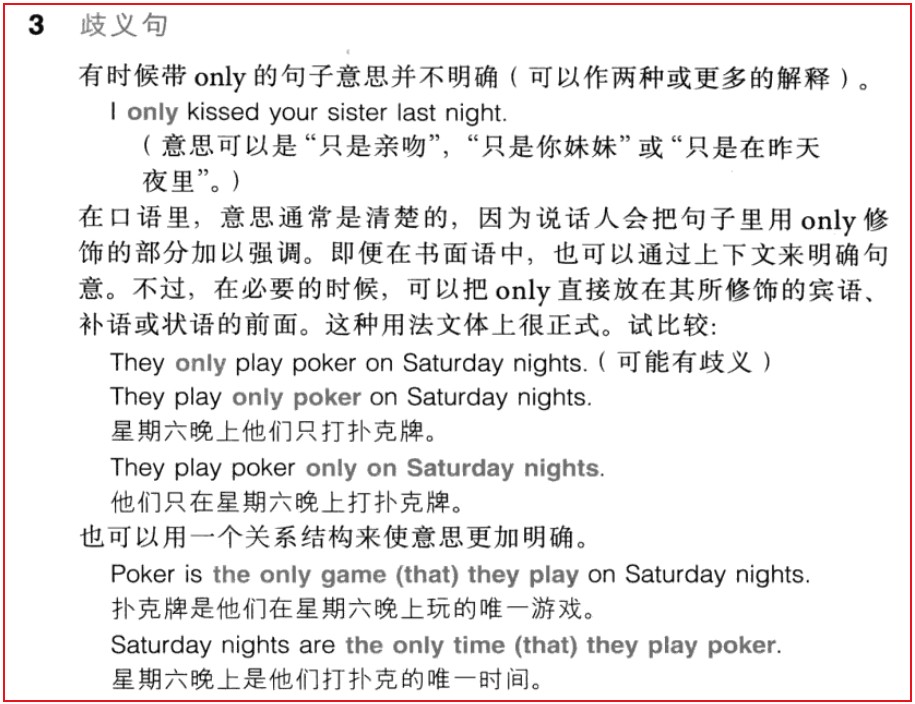3 only在什么情况放在被修饰词语后面
only通常放在被修饰词语之前。如:
There are only two more weeks until summer vacation. 只有两周就到暑假了。
He was only a baby when his father died. 父亲去世时他还只是个婴儿。
Leave her alone. She's only a kid. 别管她,她只是个孩子。
It was quiet in the room, but only for a moment. 房间里很安静,但只是短暂的一会儿。
She is only partly/partially to blame. 她只承担部分责任。
但 only 可以放在被修饰的词语之后吗?若可以,有什么规则吗?
最佳答案 2024-11-28 06:35
only 在句中的位置比较复杂。简单地说,为避免误解,only 通常放在它所修饰的词语之前。但有时 only 也可放在它所修饰的词语之后,比如当它所修饰的词语位于句末时:
The medicine is used only externally. 这种药只能外用。
The medicine is used externally only. 这种药只能外用。
Ice cream is on special only this week. 冰淇淋仅古本周内特价优惠。
Ice cream is on special this week only. 冰淇淋仅古本周内特价优惠。
另外,only位于句末的用法还经常出现在公告或标识语中:
Ladies only. 只限女士。
Admission by ticket only. 凭票入场。
For external application only. 仅限外用。
Admittance is by invitation only. 非请莫入。
Parking is for customers only. 车位仅供顾客使用。
This area is for pedestrians only. 此处只许步行。
在英语口语中,人们通常把 only 词放在动词(实义动词)前面,通过重读 only 所修饰的词语来体现所要强调的含义:
He had written only three books. 他只写了三本书。
He had written three books only. 他只写了三本书。
He had only written 'three books. 他只写了三本书。
但是,在书面语中(无法通过重读来体现强调的情况下),如果没有明确的上下文语境暗示,直接将 only 放在动词前,则有可能产生歧义。比如 Swan 在其 PEU 中就认为下面一句是有歧义的:
I only kissed your sister last night.

如果觉得我的回答对您有用,请随意打赏。你的支持将鼓励我继续创作!

- 1 关注
- 0 收藏,970 浏览
- 肖晓英 提出于 2024-11-24 08:22
相似问题
- 句子成分分析 1 回答
- only后接句子用不用that的疑问(only / only that) 2 回答
- only后面的反意疑问句可以用肯定式吗 2 回答
- only用法的一个重大疑问 2 回答
- only 在句中不同位置的含义 1 回答
-
 《高考英语备考1号·速效编》
《高考英语备考1号·速效编》
-
 《高考英语备考1号·写作编》
《高考英语备考1号·写作编》
-
 《高中英语晨读晚记》
《高中英语晨读晚记》
-
 《高中英语错题笔记》
《高中英语错题笔记》
-
 《零起点考大学英语》
《零起点考大学英语》
-
